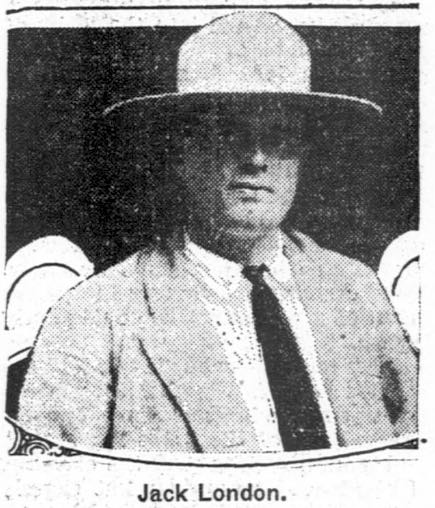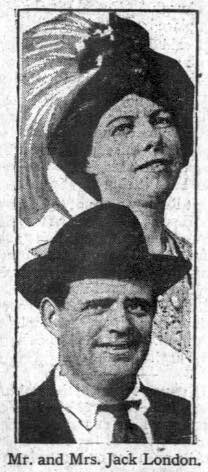
The internet is filled with writing advice from numerous writers, but how about Jack London? Sure, he’s dead and the advice was written a long time ago, but it is still relevant today.

HOW JACK LONDON “ARRIVED”
Popular Author Struggled Hard for High Position He Holds
Jack London, the fascinating short story writer and brilliant war correspondent, now at the front, is but twenty-eight years old. Three years ago he was unheard of by the reading world. Today he is read everywhere, is sought by publishers, and the pages of the magazines, from The Century down, are open to him.
The story of how he “arrived,” how he first set foot upon the stepping stone to success, he tells in The Editor, the New York magazine for literary workers, incidentally giving the latter class some excellent advice. Here are a few of his terse, pregnant sentences.
1. Work! Don’t wait for some good Samaritan to tell you, but dig it out yourself.
2. Fiction pays best of all.
3. Don’t write too much. Don’t dash off a 6000 word story before breakfast.
4. Avoid the unhappy ending, the harsh, the brutal, the tragic, the horrible — if you care to see in print the things you write.
5. Keep a notebook. Travel with it, eat with it, sleep with it. Slap into it every stray thought that flutters up into your brain.
“As soon as a fellow sells two or three things to the magazines,” says Jack London, “his friends all ask him how he managed to do it,” and then he goes on, in his own racy way, to tell how it happened to him.
He had many liabilities and no assets, no income and several mouths to feed. He lived in California, far from the great publishing centers, and did not know what an editor looked like. But he sat down and wrote. Day by day his pile of manuscripts mounted up. He had vague ideas, obtained from a Sunday supplement, that a minimum rate of $10 a thousand words was paid, and figured on earning $600 a month, without overstocking the market.
One morning the postman brought him, instead of the usual long, thick manuscript envelope, a short, thin one. He couldn’t open it right away. It seemed a sacred thing. It contained the written words of an editor of a big magazine. When, modest as ever, he had figured in his mind what the offer for this 4000 word story would be at minimum rate — $40, of course — he opened the letter. Five dollars!
Not having died right then and there, Mr. London is convinced that he may yet qualify as an oldest inhabitant. Five dollars! When? The editor did not state.
But, by and by, in the course of its wandering, one of his stories reached an editor who could see the genius of Jack London, and had the patience to penetrate beneath the husk of wordy introduction and discover the golden grain.
Here is the incident that proved the turning point in Jack London’s literary career, as he so graphically tells it:
“Nothing remained but to get out and shovel coal. I had done it before, and earned more money at it. I resolved to do it again, and I certainly should have done it, had it not been for The Black Cat.

“Yes, The Black Cat. The postman brought me an offer from it for a 4000 word story which was more lengthy than strengthy, if I would grant permission to cut it down half. Grant permission? I told them they could cut it down two halves if they’d only send the money along, which they did, by return mail. As for the $5 previously mentioned, I finally received it, after publication and a great deal of embarrassment and trouble.”
And the rate he received for his first Black Cat story was nearly 20 times what the five-dollar editor paid!
Nor is Jack London the only writer who has been lifted from obscurity to prominence by the lucky Black Cat, which, as the New York Press has truly said, has done more for short story writers and short story readers than any other publication.
Each of its famous prize competitions has brought new writers to the front. In its more recent, the $2,100 prize was won by a young Texan who had never before written a story, and the second, $1,300, went to a lawyer’s wife in an obscure Missouri town.
It has just inaugurated another contest in which $10,600 will be paid to writers in sums of from $100 to $1,500. [It is “nice” to know that writers were paid more in 1904 than online content writers are paid today.] This will, no doubt, add many new names to the list of those who have “arrived” through its recognition.
The conditions are announced in the current issue of The Black Cat, and will also be mailed to any one by the Shortstory Publishing Company, Boston, Mass. Even those who cannot write a winning story themselves may earn $10 by giving a timely tip to some friend who can.
But all should bear in mind that it will be entirely useless for any one to send a story to The Black Cat without first reading and complying with all the published conditions. Here is a chance for the reader to dig dollars out of his brain, for what life does not at least contain one tale worth telling?
[Source (1904, July 01). How Jack London arrived. The Rice Belt Journal, p. 3.]

